Michael Chong’s unusual path to Tory contender
Chong on family, race, governance—and a bid to lead the Conservatives
Federal Conservative leadership hopeful Michael Chong photographed on his 100-acre farm. (Photograph by Jaime Hogge)
Share
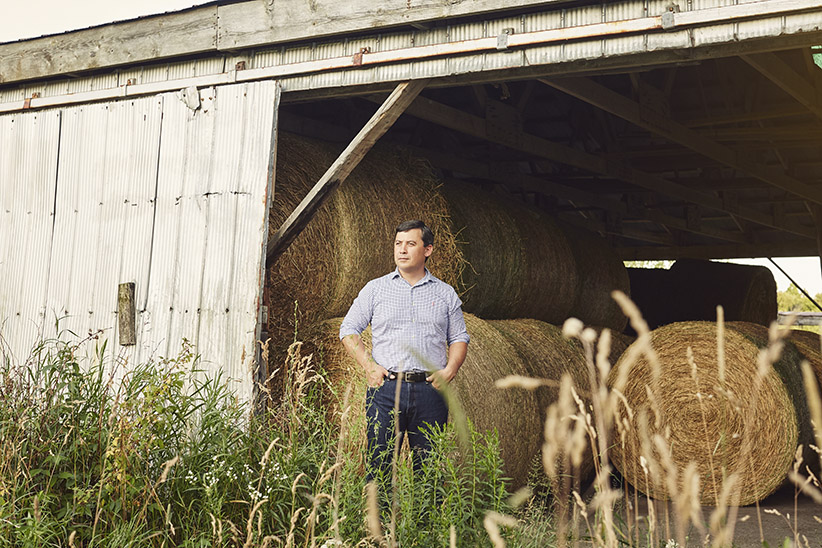
Even when he was growing up in a southern Ontario farming community that was almost entirely white, Michael Chong, the son of a Chinese immigrant father and a Dutch immigrant mother, says he wasn’t often conscious of looking different. He endured some schoolyard taunts and bullying when he was little, but after that he felt warmly accepted in Fergus, Ont., Chong says, and wasn’t again given cause to think much about what set him apart.
But there was a fleeting moment when he recalls feeling that difference in a way that has stuck with him over the years. When Chong was in high school, on one of his infrequent outings to Toronto, he made eye contact with another teen who also looked to be of mixed Asian and European descent. It was the first time he was aware of a boy, even a stranger, sharing that background with him. “We kind of looked at each other and kind of knew,” Chong said in a recent interview. “It was this otherworldly experience.” That was it, though—they didn’t speak and life went on.
Chong’s life has been an example of how, depending on personality and circumstances, ethnicity sometimes doesn’t appear to matter all that much. He still lives on a farm just two over from the one he grew up on, fitting in comfortably, as he always has, among neighbouring families with names like Gilchrist, Mandelson and Scott. In fact, as the Conservative MP since 2004 for the rural and small-town riding of Wellington–Halton Hills, he has always firmly insisted on a “non-hyphenated” concept of Canadian identity.
Yet Chong is now running for the leadership of the Conservative Party of Canada, largely on the strength of his immigrant family story. He is pitching himself to Tories as a potential leader who could win them back the support of newcomers to Canada and their children, especially from visible minority groups who fled the party of Stephen Harper in droves, in favour of Justin Trudeau’s Liberals, in last fall’s federal election.
Chong says immigrants will look at him and “see their own struggles and aspirations,” a connection that could bring dozens of ridings, especially in suburban Toronto and Vancouver, back into the winnable column for Conservatives. That has the makings, at least in theory, of a tantalizing proposition for his party as it strives to rebuild, particularly in the strategically essential suburbs.
So far, however, Chong’s candidacy hasn’t created a noticeable groundswell in a leadership contest that is, in the words of one experienced Tory strategist, “registering mildly above a flat line.” He’s up against four other MPs, none arousing any discernible excitement either: Harper cabinet stalwart Tony Clement, dapper libertarian Maxime Bernier, Kellie Leitch, a second-tier figure in Stephen Harper’s government, and long-serving Calgary MP Deepak Obhrai, whose bid for the leadership surprised many and galvanized few.
But the leadership vote isn’t until May next year, and at least two highly touted possible contenders haven’t yet announced if they are in or out: Nova Scotia’s Peter MacKay, who didn’t run in last year’s election, after stints as Harper’s foreign affairs, defence and justice minister, and Ontario MP Lisa Raitt, now the Tory finance critic who also held a string of cabinet portfolios—Natural Resources, Labour and Transport—under Harper. And then there’s TV personality Kevin O’Leary, whose musings about seeking the leadership inject a little Trump-lite fizz into the speculation. Party insiders agree MacKay, Raitt and O’Leary, along with any others who might be mulling their chances, could wait until well into the fall to join the race, and still have enough time to mount competitive campaigns.
For now, Tim Powers, a longtime Conservative operative and Ottawa-based consultant, sees Chong as the candidate with the best chance of breaking out of the pack among those already in the running. “If there’s any optimism and enthusiasm, there’s some there for Chong,” Powers says. “I think he does have the most growth potential.”
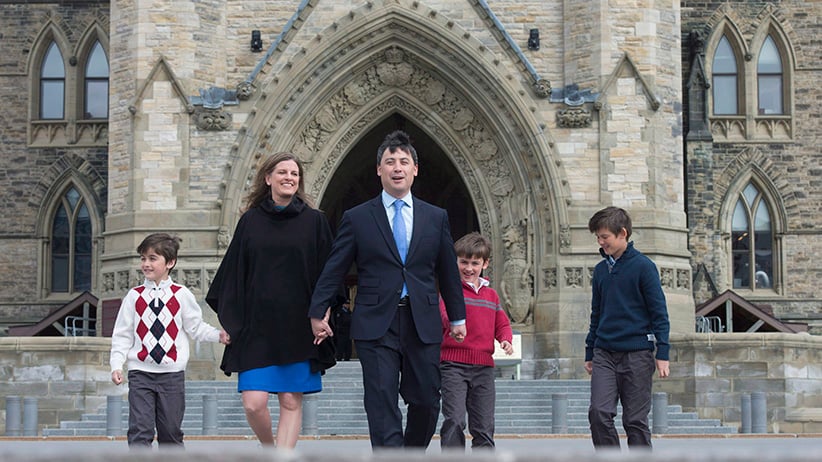
One reason is relative youth. Chong was born in 1971, about a month before Trudeau. That makes him a decade younger than Clement, for example, and five years younger than MacKay. Powers says age will matter to Tories who worry that their chances of ousting the Liberals in 2019 are slim, so they need to pick a leader who can comfortably helm their party through a rebuilding period likely to stretch through at least two elections.
He also points out that Chong has the advantage of being able to sell himself as unencumbered by the political baggage lugged by the prominent Harper cabinet veterans who are his main rivals. The reason Chong put in only nine months, rather than nine years, as a member of Harper’s cabinet is itself a definitive chapter in his unusual political backstory.
After the Tories won the 2006 election, Harper named Chong—a surprise pick at the time—to his first cabinet as minister of intergovernmental affairs and sport. But he quit later that same year over a point of principle in a highly public split with the prime minister. The issue was Harper’s unexpected tabling of a motion in the House declaring that “the Québécois form a nation within a united Canada.” Chong wouldn’t vote for it, and cabinet ministers aren’t allowed to be so free-thinking. “I believe in this great country of ours and I believe in one nation, undivided,” he said at the time, adding that defining the Québécois as distinct from other Canadian citizens smacked of an “ethnic nationalism” that he could never support.
Chong was such a little-known figure in federal political circles at the time that official Ottawa had trouble processing his exit. Quitting cabinet is all but unheard of in Canadian politics. Was this guy reckless? Was he grandstanding? Friends say he sweated the decision. Among those from whom he asked for advice was Perrin Beatty, the former Brian Mulroney-era Tory cabinet minister who had represented what became Chong’s riding from 1972 to 1993, and later become a friend and mentor. Beatty, who is now president of the Canadian Chamber or Commerce and is no longer involved in partisan politics, says Chong dropped by his Ottawa home one evening just before Harper’s Québécois-nation motion was to be voted on in the House.
“We sat up until three or four in the morning talking,” Beatty remembers. “He was agonizing over what to do.” Chong told Beatty he supported the broad direction of the Harper government, disagreeing only with the motion. “What I said to him, at considerable length, was that it was precisely because he did feel torn by conscience that he should stay in,” Beatty says. “I said, ‘If you leave you’ll be replaced by somebody who wouldn’t agonize.’ ”
The veteran went to bed thinking he had persuaded the rookie not to throw away his chance to be an influential player. He was wrong. “I admire him enormously,” Beatty says. “He paid a great price for having done that; I think the country paid a price.”
Chong’s self-exile from Harper’s tightly disciplined cabinet didn’t come out of nowhere. His convictions on what it means to be Canadian can be traced to his family background. It’s a classic immigrant success story, but one shadowed by tragedy. After arriving in Canada almost penniless in 1952 from Hong Kong, Paul Chong became a modest-mannered trailblazer. He worked his way through the University of Manitoba to earn a bachelor of science degree, and then completed medical school at the University of Ottawa—a remarkable achievement for a Chinese immigrant at the time.
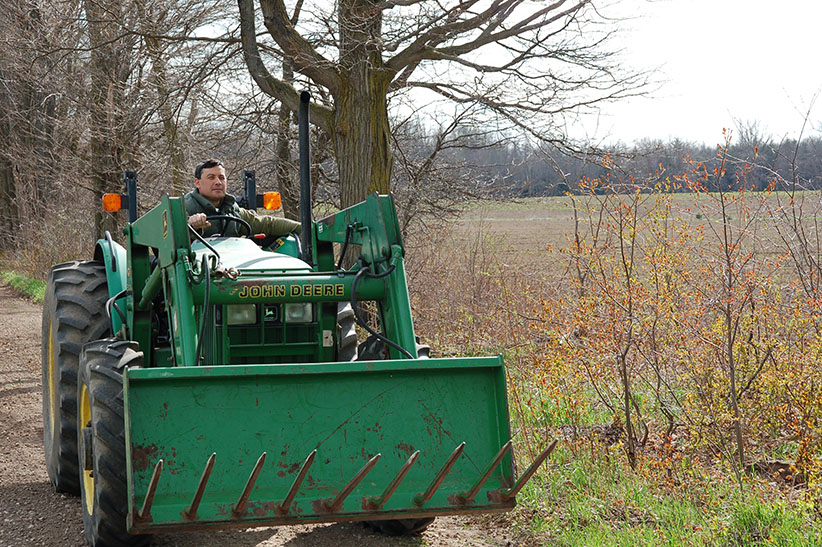
Dr. Chong met his future wife while training as a specialist in internal medicine at Queen’s University. Cornelia de Haan had immigrated to Canada from Holland in the mid-’60s, and was working as a nurse. After they married, she gave up nursing to be a stay-at-home mom to their four children: Michael and his younger sister and two brothers. She was killed in a car accident in 1978, when Michael was only six years old. His own memories of her are vague, but he’s been told she was “a real go-getter.” (His father remarried two years after her death.) Then, in 1999, in a terrible coincidence, Chong’s father was killed in a crash at the same rural intersection, not far from the family home, where Chong’s mother had perished two decades earlier.
Fitting his parents’ untimely deaths neatly into the narrative of Chong’s political career is, of course, impossible. “I think it affected me deeply. Looking back now, it must have,” he says. “More than anything else, it grows you up very quickly, having to confront the concept of death in such an immediate way.” He says it colours the way he thinks about his wife, Carrie, whom he met in university, and their three sons, ages 11, 8 and 6. They live on a farm near the one where he was raised, about 85 km from Toronto. “There’s not a day that my wife and kids leave the house in the car that I don’t think they might not come back,” he says. “But it’s not something you dwell upon; it’s just something that crosses your mind.”
That awareness of the fragility of life contrasts with Chong’s sense of the durability of home. Most of his neighbours have known him since he was a toddler—an extraordinary degree of continuity through life for a 44-year-old in 2016. Some of Chong’s childhood stories have a old-timey flavour. He talks nostalgically about working as a farm hand for a neighbour, Jack Gilchrist, through his teenaged years. “I did everything,” Chong says. “I was in his barn on a New Year’s Eve helping to birth a calf when everybody else was out having a good time in high school.”
He connects those farm experiences with his own highly localized version of Canadian identity. “When you’re doing what generations have done who settled that part of the country, it really does reinforce that my home is this country,” he says. “It’s not Hong Kong and it’s not the Netherlands. My home is Canada; I’m Canadian.”
Still, in launching his bid for the leadership, he put the emphasis on his parents’ parallel sagas, speaking of how his father had seen Canadians soldiers try to defend Hong Kong in the Second World War, while his mother was in Holland at the war’s end when her country was liberated by Canadian troops. “I literally would not be here today were it not for the sacrifice of Canadian soldiers in two theatres of war,” he said.
Chong’s interest in history isn’t just a matter of family lore. He studied the subject, along with philosophy and politics, at University of Toronto’s Trinity College, a traditional incubator for the Canadian establishment, in the early 1990s. During those years, questions about what Canada was all about were in the air for students who cared about national affairs. Brian Mulroney’s Meech Lake accord had failed to reform the Constitution in 1990, and the follow-up Charlottetown accord was defeated in a referendum in 1992. The wrenching 1995 Quebec referendum on separation came close to splitting up the country. “It was an intellectually stimulating environment; we had arguments every day when we met for dinner,” Chong says. “It was also a time of a lot of uncertainty.”
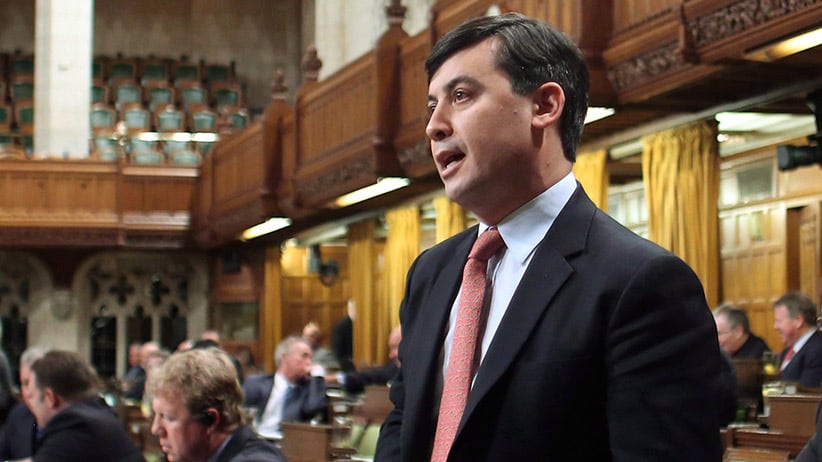
Chong’s first roommate at Trinity was Rudyard Griffiths, now familiar to many Canadian voters as the moderator of the televised debate among the federal party leaders on foreign policy issues during last fall’s campaign. Griffiths heads a charitable foundation and also works as a broadcaster. Back in university, he and Chong became so devoted to Canadian history that only a few years after they graduated, they helped co-found the Dominion Institute, which promoted history and civics education in Canadian high schools. (In 2009, the institute merged with the older Historica Foundation to form Historica Canada.)
Chong says their shared passion for the country’s past grew largely out of frustration at hearing the case for Quebec staying in Canada constantly being made on the grounds that unity was good for the economy. “There was a much bigger reason for us to stay together, which is that we are all Canadians,” he says.
Griffiths connects the dots between Chong’s grateful immigrant parents, his passionate interest in Canadian identity, and the unconventional way he first distinguished himself in Ottawa. “People often question, ‘Why did he resign from cabinet? Why was it such an important issue for him?’ ” Griffiths says. “I think it does go back to his family history and this belief, that many immigrants have, of undifferentiated, accessible Canadian citizenship that doesn’t unduly privilege pre-existing groups, whether defined by geography or history.”
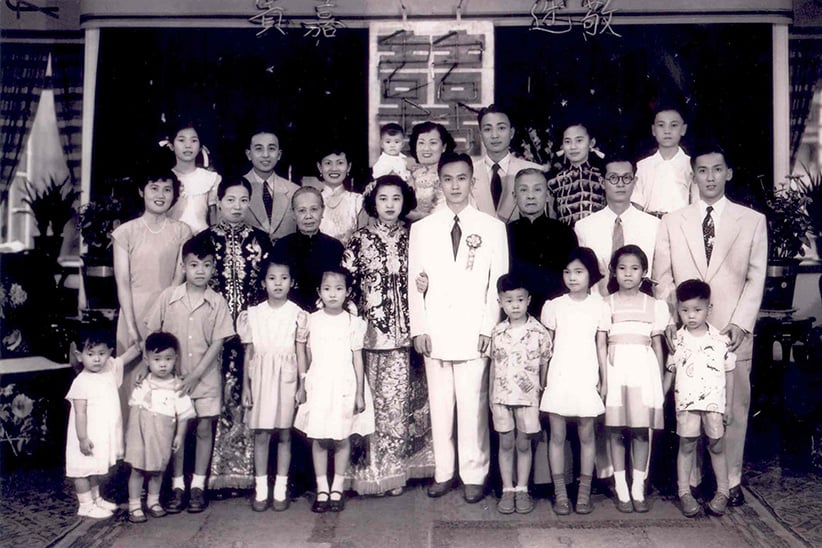
If Canada’s constitutional battles were a key debating point in the early 1990s, international shifts in who held power also tested the convictions of coming-of-age Conservatives. Chong had already volunteered for the Tories as a high school student in Fergus, working on Beatty’s campaigns. But then the 1980s heyday of Ronald Reagan, Margaret Thatcher and Brian Mulroney gave way to the 1990s rise of Bill Clinton, Tony Blair and Jean Chrétien. Chong says he saw those centre-left leaders co-opting fiscal conservatism, rather than replacing it, with policies like Chrétien’s balancing of the federal budget. On economic policy, he says, “We won the argument.”
After graduating, Chong pursued a career that didn’t seem like an obvious path into politics. He learned about information technology on a series of jobs through the ’90s, rising to head the IT department of the National Hockey League Players’ Association, and serving as an IT consultant for Toronto’s airport authority. But he always had political ambitions. In the 2000 federal election, he ran and lost. In 2004, he tried again and won. His timing seemed perfect. The Liberals were faltering under Paul Martin, Chrétien’s successor, and Harper’s ascendant Conservatives were top-heavy with Western MPs, creating a clear opening for a promising Ontario up-and-comer.
Chong’s abrupt departure from cabinet seemed to snuff out that promise. Working alone as backbencher, though, he doggedly carved out what turned into a surprisingly prominent niche for himself as a champion of parliamentary reform. It started unspectacularly when he wrote an article for the staid Canadian Parliamentary Review, complaining that MPs were too much under the thumbs of their parties’ leaders.
That eventually lead to him tabling his own Reform Act in late 2013, the sort of private member’s bill that the House and Senate rarely pass into law. Chong tenaciously pushed his legislation, however, and it finally passed last year, after some of his stronger proposals—like eliminating the Elections Act rule that leaders must approve candidates running for their party—were taken out. Still, under the law, MPs gained at least the possibility of claiming more clout. They now vote inside their party caucuses at the start of a parliamentary session on whether or not to grant themselves key powers, including the right to vote to remove their leader in a crisis, or to kick out caucus members.
RELATED: Michael Chong explains his Reform Act in 60 seconds
It amounts to a modest start to pulling power away from party leaders and putting it into the hands of ordinary MPs. As a leadership contender, Chong continues to urge more reforms in that direction. For instance, he says the membership of House of Commons committees—now tightly controlled by party leaders—should be decided by a secret-ballot vote of MPs. Membership on the committees, he adds, should be guaranteed for a full parliamentary session, eliminating the power of leaders to control their MPs by threatening to deny them plum committee assignments.
Griffiths says Chong’s enthusiasm for this sort of parliamentary change puts him squarely in the tradition of Preston Manning’s Reform party of the 1990s. “These are really causes and ideas that Manning first brought to Ottawa,” he says. “To that extent, there’s a side of Mike that’s supercharged with the DNA that drove the original Reform movement.”
The notion of Chong positioning himself as carrying forward the party’s Reform convictions won’t fit naturally with his image in the eyes of many Western Conservatives. He is more commonly seen as fitting into the mild-mannered tradition of Ontario Toryism, rather than the populist Prairie brand. As well, Chong is staking out a position on carbon pricing that’s likely to be a difficult sell in Alberta—often seen as the heartland of the modern Conservative party—where tough times in the oil patch have hardened views against any policy that promises to raise the price of fossil fuels.
But Chong is promoting a much higher price on carbon emissions as part of a broader, Conservative-friendly, tax-cutting policy. Right now B.C. is by far furthest ahead among the provinces with its carbon tax of $30 per tonne of CO2 emissions. But experts agree the national price on carbon would have to be far higher to discourage energy consumption enough for Canada to meet its UN commitment to cut greenhouse gas emissions 30 per cent below 2005 levels by 2030.
Chong says Ottawa could “coordinate a consistent price” far above the $30 a tonne most provinces now seem inclined to impose on their own. But crucially, he adds, the federal government should transfer whatever revenues it collects under a carbon pricing mechanism back to the provinces, with an incentive built in for provincial governments that use these new payments from Ottawa to cut their income taxes. “That’s just an example of the type of mechanism the federal government could use,” he says. “I get a good response when I tell Conservatives we need to use these revenues to cut income taxes.”
Beyond his carbon-pricing position, Chong challenges Tories on several other policy fronts. His push for MP empowerment amounts to a swerve for a party accustomed to top-down discipline. But it’s his promise of a fresh chance with immigrant voters that brings Chong and the Conservatives’ challenge most neatly into alignment. If he can persuade his party to see him that way, he has a chance to add another unlikely chapter to what’s already one of the most unusual stories in Canadian politics.